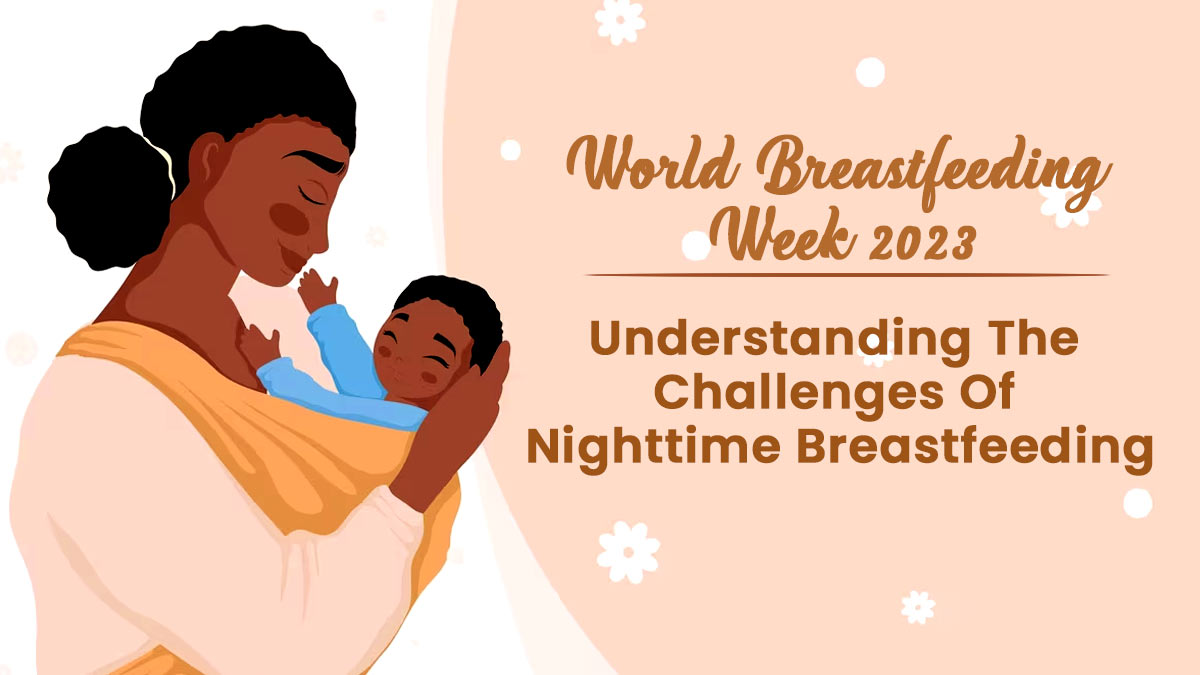

Exclusive breastfeeding is recommended for all infants between the ages of 0-6 months. This means that your baby will receive breast milk as the only source of nutrition, and not any other foods or liquids, except for medications or vitamin and mineral supplements, as prescribed by doctors. Exclusively breastfed babies will feed about every 2 to 4 hours, meaning they will get hungry during the day as well as nighttime.
Nighttime breastfeeding is something all mothers have to perform. Research and health experts believe it has its own set of benefits, but also come with several challenges. We spoke to three leading experts to understand the same.
Nighttime Breastfeeding

Dr Sreedhara M S, Consultant Neonatologist, Rainbow Children’s Hospital, Hebbal, Bengaluru, shares that it is normal for babies to feed 8-12 times a day in the first few weeks or months of life.
Also Read: World Breastfeeding Week 2023: Decode How Often Mothers Should Breastfeed Their Babies
“They have smaller stomach sizes and frequent feeds ensure a continuous supply of nutrients to meet the baby’s needs. Some babies sleep for longer stretches at night but most would wake up every 2-4 hours for feeds during night and this can continue beyond six months throughout the first year and sometimes more,” she adds.
Benefits Of Nighttime Breastfeeding

Dr Swapnil Sinha, Obstetrician and Gynaecologists, Apollo Clinic, Marathahalli, Bengaluru, says, “In the initial months, when mothers have to breastfeed their babies ‘on demand’, it becomes difficult to avoid nighttime feeding.”
However, it holds certain benefits, such as increasing the release of milk secretion hormone ‘prolactin’. Prolactin is a hormone that stimulates milk production after childbirth.
Research has shown that more prolactin is produced at night, and therefore, breastfeeding at night is especially helpful for keeping up the milk supply.
Additionally, a study published in the Journal of Clinical Sleep Medicine concludes that women who breastfed exclusively averaged 30 minutes more nocturnal sleep than those who used formula at night, but measures of sleep fragmentation did not differ.
“New mothers should be encouraged to breastfeed exclusively since breastfeeding may promote sleep during postpartum recovery,” the academic paper adds.
Dr Smrithi D Nayak, Consultant-Obstetrician and Gynaecologist, Aster RV Hospital, Bengaluru, adds saying, “It [Nighttime Breastfeeding] helps establish the baby’s circadian rhythm, potentially leading to longer sleep stretches as they grow older.”
Nighttime breastfeeding can also promote strong emotional bonds between the mother and baby through skin-to-skin contact, according to the doctor.
Also Read: World Breastfeeding Week 2023: Know If Leaking Breasts Are Normal; What You Can Do About Them
Challenges
It is important to note that frequent nighttime wake-ups can lead to sleep deprivation for both the mother and the baby, impacting their overall well-being.
“Transitioning away from nighttime feedings can be emotionally challenging for both the mother and baby as they adjust to new routines. Other safety concerns include ensuring a safe sleep environment during nighttime feedings, such as avoiding bed-sharing to prevent Sudden Infant Death Syndrome (SIDS).”
Dr Sreedhara adds, “Maternal exhaustion and sleeplessness can be challenging. Misinterpreting the frequent awakening as a sign of less milk supply or the unnecessary introduction of formula and bottle feeding at night can create anxiety in mothers and adversely affect the baby’s health, respectively.”
Coping Strategies For Mothers Who Breastfeed At Night

To help mothers cope with breastfeeding at night, Dr Sinha shares a few strategies:
- Lie down in the correct position which helps the baby to latch better and at the same time provides support and comfort to the mother’s body and prevents exhaustion
- Choose a good maternity wear, which opens up from the front and is loose and allows air passage
- Keep the things required for nursing close enough
- Put on a soft music that can help u think positively and deviate your mind from from the long hours you spend feeding your baby
- Do not hold yourself from asking for your partner or husband to help, especially when you are tired or ill
Conclusion
During the early phase of motherhood, breastfeeding can be a time consuming responsibility. Day or night, you will have to stay close to your baby as they will need feeding every 2-4 hours. Nighttime breastfeeding can be the most difficult as it deprives mothers and the baby of their sleep. Exhaustion is inevitable and therefore, it is important to follow strategies that provide you with comfort.
اكتشاف المزيد من ينبوع المعرفة
اشترك للحصول على أحدث التدوينات المرسلة إلى بريدك الإلكتروني.
